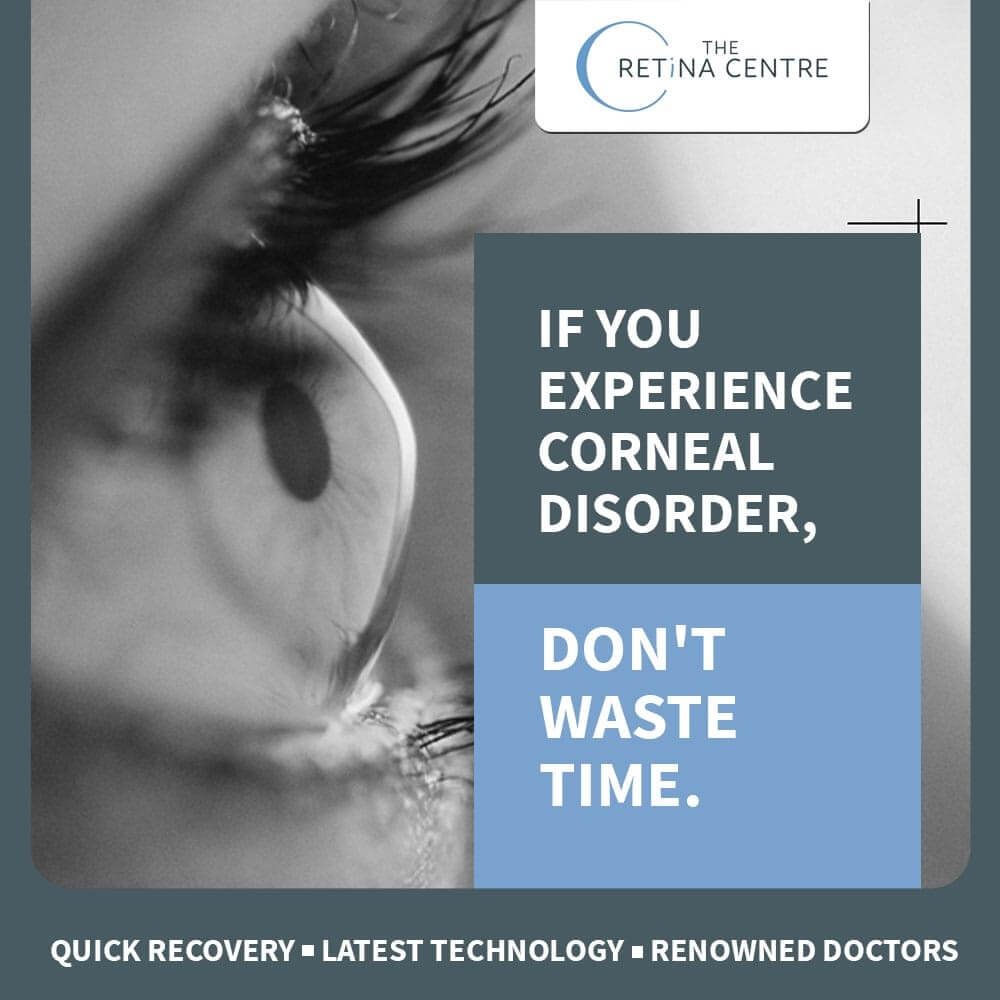Corneal Disorder Treatment

Corneal diseases are eye conditions that can cause clouding, distortion, scarring, and eventually blindness. Over 4.5% of Indian adults have corneal blindness. The number of people with early-stage corneal disorders is much higher. It can occur due to eye trauma, nutrient deficiency, natural degenerations, auto-immunity, and many other reasons. Living in dusty, polluted environments, exposure to high temperatures for long hours can also cause cornea-related problems.
The common corneal disorders are Bullous keratopathy, Cogan syndrome, Corneal ulcer, Herpes simplex keratitis, Herpes zoster ophthalmicus, Interstitial keratitis, Keratoconjunctivitis sicca, Keratoconus.
The matter of relief is that the majority of corneal disorders are curable today if diagnosed in advance. As a reputed multi-specialty eye-care hospital, The Retina Centre offers the latest industry-standard infrastructure and expert doctors to treat any corneal diseases.
TRC team of doctors with expertise and experience in treating corneal disorder –
Dr. Jnanankar Medhi
A timely eye check-up is necessary to diagnose the corneal disorder early. Contact TRC out-patient department and make an appointment with any of our expert doctors.
Eye Specialists
The Retina Centre you get the expertise of professionals with 28+ years of experience.
Make an Appointment
Triumph the timely treatment
Avoid wasting valuable time in hesitation. We advise you to seek help when in confusion. Talk to our doctors and make an informed decision. Book an appointment today!
We are open:
Mon – Sat: 8 am – 7 pm,
Sunday: 9 am – 5 pm
Frequently Asked Questions
What is corneal dystrophy? Can it be treated?
It is a hereditary eye disorder in which an extraneous opaque substance accumulates on the cornea obstructing front vision. Usually, the condition occurs in both the eyes simultaneously and progresses gradually. The primary reason behind corneal dystrophy is genetics; external factors like injury, eye trauma usually do not cause such condition. Early detection of corneal dystrophy can help to cure the disorder using eyedrops and ointments without surgical intervention. Late diagnosis requires surgical procedures like corneal transplantation, penetrating keratoplasty. These procedures offer long term solution to dystrophy.
How to treat an inflamed cornea?
Inflammation of the cornea can occur due to bacterial and viral infection, eye injury, and lack of lubrication. The condition is common among people using contact lens, suffering from dehydration, diabetes, and poor immunity. Corneal inflammation results in convulsion, swelling, itching, discomfort, clouding of vision, and increased tear flow. The usual treatment of corneal treatments are,
● Use of lubricant eye drops
● Anti-bacterial eye medicines
● Warm compression to control swelling and itching
How to treat corneal disease?
The majority of corneal diseases affect the transparent layer of the cornea. Early detection of corneal disease is always helpful as it helps to cure and manage associated discomfort better. The primary treatments are the use of ointments and eye drops. Conditions like dystrophy may require the use of a special contact lens and lens transplant.
How can lifestyle choices affect corneal health?
Lifestyle plays a vital role in maintaining good eyesight. Factors like smoking, poor diet, and too much screen time can damage corneal health and lead to dryness and irritation.
Are corneal diseases hereditary?
Yes, some corneal diseases like keratoconus, can be hereditary. People with such conditions must go for regular eye checks for early detection.
What are early warning signs of corneal diseases?
Alarming signs like blurriness, sensitivity to light, or constant eye irritation occur due to dry eyes but also indicate corneal issues. It is important to consult an eye specialist.
How do I know if I need a corneal transplant?
Corneal transplants are needed when your vision is fully impaired due to scarring, dystrophy, or advanced keratoconus.
Can corneal diseases be prevented?
All corneal diseases are preventable by following a healthy lifestyle via a properly balanced diet with vitamins, staying hydrated, and protecting the eyes from harmful UV rays.
What should I avoid after corneal surgery?
After the surgery, avoid rubbing your eyes, and avoid exposure to dust or bright light, as this can mitigate the chances of infection and speed up the recovery process.


